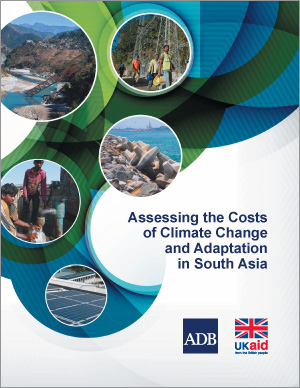🌿 COP 30 - Building a Greener Tomorrow
The 30th UN Climate Change Conference (COP 30) is taking place in Belém, Brazil. Stay informed about global climate actions, negotiations, and live sessions from 10 – 21 November 2025.
Get Updates
Assessing the Costs of Climate Change and Adaptation in South Asia

Files
Date
January, 2014Author(s)
- Mahfuz Ahmed and Suphachol Suphachalasai
Abstract
South Asia, home to about 1.5 billion people, nearly a third of whom are still living in poverty, faces a major challenge in achieving rapid economic growth to reduce poverty and attaining other Millennium Development Goals in an era of accentuated risks posed by global climate change. The impacts of climate change are likely to result in huge economic, social, and environmental damage to South Asian countries, compromising their growth potential and poverty reduction efforts. Countries in the greater Himalayas region—which includes Bangladesh, Bhutan, northern India, and Nepal—are facing increased frequency and magnitude of extreme weather events resulting in flooding, landslides, damage to property and infrastructure, devastation of agricultural crops, reduction of hydropower generation, and negative impact on human health. The coastal areas of Bangladesh, India, the Maldives, and Sri Lanka are at high risk from projected sea level rise that may cause displacement of human settlements, saltwater intrusion, loss of agricultural land and wetlands, and a negative impact on tourism and fisheries. This Asian Development Bank (ADB) study examined the economic costs associated with the impacts of climate change and the cost and benefits of adaptation in Bangladesh, Bhutan, India, the Maldives, Nepal, and Sri Lanka. The study aimed to (i) assess the biophysical impacts of climate change in the region, including individual country impacts, and (ii) estimate the total economic loss to the countries in the region by 2100, taking into account the different scenarios and impacts projected across vulnerable sectors, and then to estimate the magnitude of funding for adaptation measures required to avert such potential losses. Results of the study will aid development of future policies and programs for climate change adaptation in the region, including initiatives for regional cooperation and capacity building in climate change management. The study covered the following sectors: agriculture, terrestrial ecosystems, water, marine and coastal resources (except Bhutan and Nepal), health, and energy. The study was coordinated with other ongoing and planned climate change initiatives in the region and builds on existing studies. However, no previous study of the whole region exists.
Citation
Ahmed, M. and S. Suphachalasai. Assessing the costs of climate change and adaptation in South Asia. Mandaluyong City, Philippines: Asian Development Bank, 2014.
Publisher
Asian Development Bank
Rights Holder
© 2014 Asian Development Bank
URI
https://knowledgehub.pksf.org.bd/collections/V1RSYjNHdUczUW1NeUZhb1VrQ2dkdz09
